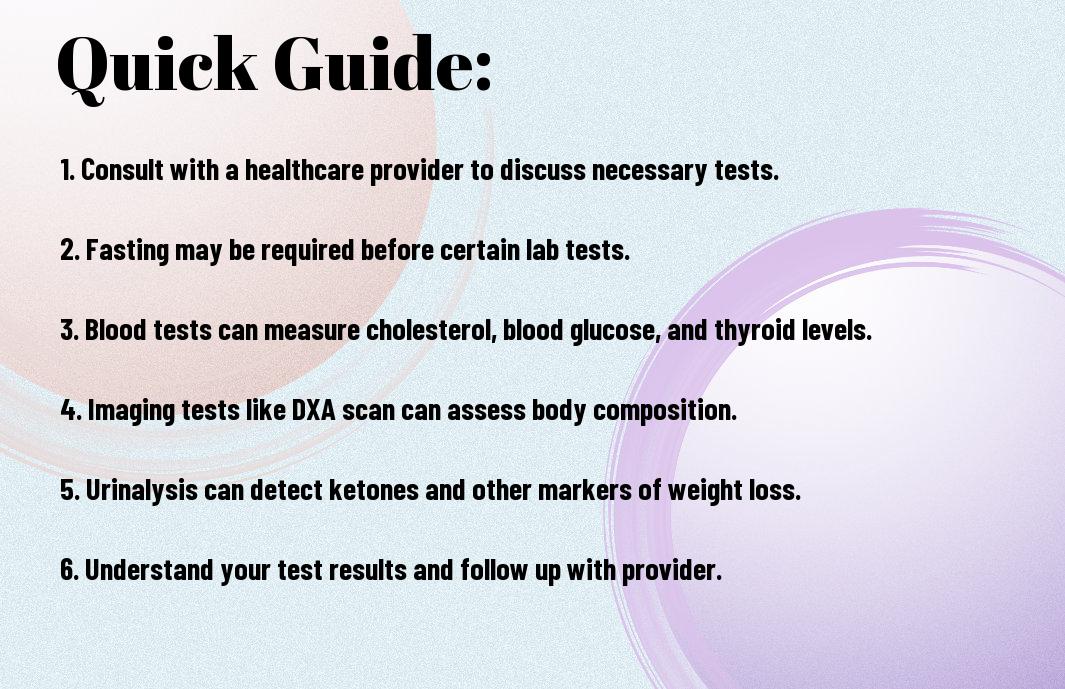This comprehensive guide will walk you through the important information you need to know about weight reduction lab tests. Understanding the results of these tests is crucial for anyone on a weight loss journey. From cholesterol levels and blood sugar to thyroid function and vitamin deficiencies, these tests provide valuable insights into your overall health. By interpreting these results correctly, you can optimize your weight loss efforts and make informed decisions about your health.
Key Takeaways:
- Comprehensive evaluation: Weight reduction lab tests provide a comprehensive evaluation of various health markers that can impact weight loss.
- Key indicators: These tests can reveal key indicators such as thyroid function, blood sugar levels, cholesterol levels, and inflammation markers which play a crucial role in weight management.
- Personalized guidance: Understanding the results of weight reduction lab tests can help in receiving personalized guidance from healthcare professionals on optimizing weight loss strategies.
- Identifying obstacles: These tests can help in identifying potential obstacles to weight loss such as hormonal imbalances or nutrient deficiencies that need to be addressed for successful weight management.
- Track progress: Regularly monitoring weight reduction lab tests can help in tracking progress, making necessary adjustments to diet and lifestyle, and ensuring overall health improvement during the weight loss journey.

Understanding Weight Reduction Lab Tests
Before begining on a weight loss journey, it is crucial to understand the role of lab tests in monitoring your progress. Weight reduction lab tests provide valuable insights into your body’s composition, metabolism, and overall health, helping you make informed decisions to reach your goals effectively.
Types of Lab Tests for Weight Reduction
- Metabolic Panel: This test measures key markers like glucose, cholesterol, and electrolytes to assess your body’s metabolic function.
- Thyroid Function Tests: These tests evaluate thyroid hormone levels, which play a significant role in regulating metabolism and weight.
- Hormone Tests: Hormones like insulin, cortisol, and leptin can impact weight loss and are measured to understand their influence.
- Body Composition Analysis: This test determines the percentage of fat, muscle, and water in your body, providing insights into your overall health.
- Vitamin and Mineral Testing: Deficiencies in nutrients like vitamin D, B12, or iron can affect metabolism and energy levels, impacting weight loss efforts.
Assume that these lab tests help in identifying underlying health issues that may be hindering your weight loss progress.
Importance of Lab Tests in Weight Loss Journey
If you are serious about losing weight, incorporating lab tests into your journey is necessary. These tests can uncover hidden factors that may be impacting your ability to lose weight, such as hormonal imbalances, nutrient deficiencies, or metabolic issues. By identifying and addressing these factors, you can optimize your weight loss efforts and achieve sustainable results.
You may not realize the impact of certain imbalances or deficiencies on your weight loss journey without proper testing. For instance, a thyroid dysfunction can slow down your metabolism, making it harder to lose weight even with diet and exercise. By identifying this issue through lab tests, you can work with your healthcare provider to develop a targeted treatment plan that addresses the root cause of your weight struggles.
Factors Affecting Weight Reduction Lab Test Results
Assuming that you have undergone weight reduction lab tests, it’s vital to understand that various factors can affect the results. These factors can range from hormonal imbalances to insulin resistance and gut health, all of which play a crucial role in determining your body’s ability to lose weight effectively.
Any changes in these factors can directly impact the outcome of your weight reduction journey, making it vital to address these issues to achieve sustainable results in the long run.
Hormonal Imbalance
Reduction in weight can be significantly influenced by hormonal imbalances in the body. Hormones such as cortisol, thyroid hormones, and sex hormones play a vital role in regulating metabolism. An imbalance in these hormones can lead to weight gain or hinder weight loss efforts, making it vital to address these imbalances through proper testing and treatment.
Insulin Resistance
Hormonal factors like insulin resistance can also affect weight reduction lab test results. Insulin is a hormone that regulates blood sugar levels, and resistance to insulin can lead to weight gain, especially around the abdomen. For instance, individuals with insulin resistance may have higher fasting insulin levels, which can hinder weight loss efforts and increase the risk of metabolic diseases.
Gut Health
Insulin levels can be influenced by the health of your gut microbiome. The gut microbiome plays a crucial role in nutrient absorption, inflammation regulation, and even hormone production. Plus, an imbalance in gut bacteria can lead to weight gain, inflammation, and other metabolic issues that can hinder weight reduction efforts.
Inflammation
Reduction in weight can also be affected by inflammation in the body. Chronic inflammation can disrupt hormonal balance, impair nutrient absorption, and promote weight gain. Factors such as diet, lifestyle, and underlying health conditions can contribute to increased inflammation levels, making it crucial to address these factors to support weight reduction goals.
Nutrient Deficiencies
Any deficiencies in vital nutrients like vitamin D, B vitamins, and magnesium can impact weight reduction lab test results. These nutrients play a crucial role in metabolism, energy production, and hormone regulation, all of which are vital for successful weight loss. This makes it important to address any nutrient deficiencies through supplementation or dietary changes to support your weight reduction journey.
Step-by-Step Guide to Preparing for Weight Reduction Lab Tests
Despite the discomfort and inconvenience that weight reduction lab tests may bring, proper preparation is important to ensure accurate results. Follow this step-by-step guide to make the process as smooth as possible.
| Fasting Requirements | Medication and Supplement Considerations |
ReductionMost weight reduction lab tests require fasting for a specific period beforehand. This is typically around 8-12 hours, but it’s crucial to follow your healthcare provider’s instructions precisely. | WeightBefore your weight reduction lab tests, inform your healthcare provider about any medications or supplements you are taking. Some substances can interfere with the results, so adjustments may be necessary. |
Hydration and Electrolyte Balance
Weight reduction lab tests can be affected by hydration levels and electrolyte balance. It’s important to stay well-hydrated before the tests, but be cautious of consuming excessive amounts of water, as it can dilute the results. If electrolyte levels are specifically being tested, your healthcare provider may provide specific instructions.
The accuracy of weight reduction lab tests can be compromised by contaminants or interfering substances. To ensure the validity of your results, take the following precautions.
Avoiding Contaminants and Interfering Substances
There’s always a risk of external factors affecting the accuracy of weight reduction lab tests. Be mindful of what you eat or drink before the tests, and inform your healthcare provider of any potential contaminants you may have been exposed to. This will help in interpreting the results correctly.
Another crucial point to note is that if you have any concerns about preparing for your weight reduction lab tests, do not hesitate to reach out to your healthcare provider for clarification and guidance. Taking the time to prepare properly can make a significant difference in the accuracy of the results and ultimately, in achieving your weight reduction goals.
Tips for Interpreting Weight Reduction Lab Test Results
All weight reduction lab test results should be interpreted carefully to understand the implications for an individual’s health. Here are some tips to help you make sense of these results:
- Understanding Biomarkers and Reference Ranges: For accurate interpretation, it is imperative to know the significance of each biomarker and understand the reference ranges provided in the lab report. These ranges indicate the normal levels for various parameters such as cholesterol, glucose, and thyroid hormones. If your results fall outside these ranges, it could indicate an underlying health issue. To learn more about specific tests related to weight management, consider exploring the Weight Management Baseline Test.
Understanding Biomarkers and Reference Ranges
For accurate interpretation, it is imperative to know the significance of each biomarker and understand the reference ranges provided in the lab report. These ranges indicate the normal levels for various parameters such as cholesterol, glucose, and thyroid hormones. If your results fall outside these ranges, it could indicate an underlying health issue.
Identifying Patterns and Correlations
Assuming that all lab tests are interconnected, identifying patterns and correlations between different biomarkers can provide valuable insights into how various aspects of your health impact each other. For example, high cholesterol levels may be associated with insulin resistance, indicating a risk of developing metabolic syndrome.
Results from the lab tests show a comprehensive picture of your current health status and can help in identifying potential areas of concern.
Consulting with a Healthcare Professional
Healthcare professionals such as doctors, dietitians, or wellness coaches can provide personalized guidance based on your lab test results. They can offer expert advice on how to improve your health markers through lifestyle changes, medication, or other interventions.
Creating a Personalized Weight Loss Plan
Identifying the relationship between your lab results and weight loss goals is crucial for creating a personalized plan that targets specific health markers. By addressing underlying health issues identified through lab tests, you can tailor your weight loss approach to achieve better results.
Interpreting Weight Reduction Lab Test Results
Interpreting weight reduction lab test results requires a holistic view of all biomarkers, reference ranges, patterns, and correlations to make informed decisions about your health. It is important to consult with healthcare professionals to create a personalized plan that addresses your unique health needs and weight loss goals.

Common Weight Reduction Lab Tests
Not all weight reduction lab tests are created equal. Understanding the purpose and results of common tests can provide valuable insight into your weight loss journey.
Complete Blood Count (CBC)
Common in weight management programs, a CBC provides necessary information about your overall health. It measures different components of your blood, including red blood cells, white blood cells, and platelets. An abnormal CBC result can indicate underlying health issues that may be affecting your weight loss progress.
Comprehensive Metabolic Panel (CMP)
Assuming a crucial role in weight reduction, a CMP measures various markers in your blood, such as glucose levels, electrolytes, and kidney function. This panel can give a comprehensive overview of your metabolic health, helping healthcare providers tailor a weight loss plan that suits your individual needs.
Panel tests like the Comprehensive Metabolic Panel (CMP) can help identify any imbalances in your body that could be hindering your weight loss efforts.These tests are necessary in monitoring your overall health and ensuring safe and effective weight reduction.
Lipid Profile
One of the key tests for assessing cardiovascular health during weight reduction is the lipid profile. This test measures levels of cholesterol and triglycerides in your blood, providing insight into your risk of heart disease and stroke. Monitoring these levels is crucial during weight loss, as improvements in lipid profiles can indicate positive changes in your overall health.
Blood tests like the Lipid Profile are vital in evaluating the impact of weight reduction on your cardiovascular health.Maintaining healthy cholesterol and triglyceride levels is necessary for reducing the risk of heart-related complications.
Thyroid Function Tests
Profiled in weight management, thyroid function tests assess the performance of your thyroid gland in regulating metabolism. These tests measure thyroid hormone levels and can help identify conditions like hypothyroidism or hyperthyroidism, which may impact your ability to lose weight effectively.
Reduction in weight loss plateaus, fatigue, or changes in metabolism may warrant thyroid function tests to rule out any underlying thyroid issues that could be contributing to your weight struggles.Monitoring thyroid function is crucial for optimizing weight reduction efforts.
Insulin and Glucose Tests
While evaluating insulin and glucose levels may not seem directly related to weight reduction, these tests are crucial in assessing your body’s ability to regulate blood sugar. Insulin resistance and high blood sugar levels can hinder weight loss progress and increase the risk of developing type 2 diabetes.
Tests for insulin and glucose levels play a significant role in weight management, as they can help identify metabolic issues that may be impeding your weight loss goals.Monitoring these levels is necessary for preventing complications and promoting successful weight reduction.
Pros and Cons of Weight Reduction Lab Tests
Once again, it’s important to understand the benefits and limitations of weight reduction lab tests. Here is a breakdown of the pros and cons:
| Benefits | Limitations |
|---|---|
| 1. Provides objective data for accurate diagnosis. | 1. Results may vary based on factors like hydration levels and recent meals. |
| 2. Helps in monitoring progress of treatment plans. | 2. Some tests can be costly and not covered by insurance. |
| 3. Identifies underlying health issues that may contribute to weight gain. | 3. Results may not always provide a clear picture of overall health. |
| 4. Guides healthcare providers in tailoring personalized interventions. | 4. Some individuals may feel anxious or stressed about test results. |
Benefits of Accurate Diagnosis and Treatment
Clearly, accurate diagnosis through lab tests can significantly impact the effectiveness of weight reduction efforts. By identifying underlying health issues, healthcare providers can develop targeted treatment plans that address the root causes of weight gain or difficulty in losing weight. This personalized approach can lead to more successful and sustainable outcomes for individuals striving to improve their overall health.
Limitations and Potential Drawbacks
Diagnosis of weight-related health issues through lab tests is crucial, but it is important to acknowledge the limitations and potential drawbacks. While these tests provide valuable information, results may not always present a complete picture of an individual’s health status. Factors like hydration levels, recent meals, and even stress can influence the outcome of certain tests, leading to potential inaccuracies.
Plus, some individuals may experience anxiety or stress when awaiting test results, which can have a negative impact on their overall well-being. It is important for healthcare providers to offer support and guidance throughout the testing process to ensure a positive experience for their patients.
Cost and Accessibility Considerations
Diagnosis of weight-related health issues through lab tests can also pose financial and accessibility challenges for individuals seeking care. Some tests may be costly, especially if not covered by insurance, making them prohibitive for some individuals. Additionally, access to specialized testing facilities or healthcare providers who offer these services may be limited in certain areas, creating barriers to timely diagnosis and treatment.
Another consideration is the time and resources required for individuals to undergo testing and follow-up appointments. Balancing the cost and accessibility of lab tests with the potential benefits of accurate diagnosis and treatment is a critical aspect of weight management and overall health care.
Balancing Testing with Lifestyle Changes
Reduction in weight involves a multifaceted approach that includes both medical interventions and lifestyle modifications. While lab tests can provide valuable insights into an individual’s health status, it is important to balance testing with practical lifestyle changes that promote healthy habits. Drawbacks of relying solely on lab tests include the potential for overlooking the importance of factors like diet, exercise, sleep, and stress management in achieving long-term weight reduction goals.
Conclusion
Taking this into account, understanding weight reduction lab tests is crucial for anyone looking to track their progress towards achieving their health and fitness goals. By being aware of the different types of tests available and what they measure, individuals can make more informed decisions about their diet, exercise routine, and overall lifestyle choices.
Ultimately, integrating weight reduction lab tests into your health regimen can provide valuable insights into your body’s composition, metabolism, and overall health status. By working closely with healthcare professionals and using these tests as a tool for monitoring your progress, you can optimize your weight loss journey and make positive changes that will benefit your long-term well-being.
FAQ
Q: What is the purpose of weight reduction lab tests?
A: Weight reduction lab tests are used to assess various health markers that can impact an individual’s weight loss journey, such as thyroid function, hormone levels, and nutrient deficiencies.
Q: What are some common weight reduction lab tests?
A: Common weight reduction lab tests include thyroid function tests (TSH, T3, T4), fasting glucose levels, lipid profile (cholesterol, triglycerides), vitamin D levels, and complete blood count (CBC).
Q: How do thyroid function tests affect weight reduction?
A: Thyroid function tests measure the levels of thyroid hormones in the blood, which play a crucial role in regulating metabolism. Abnormal thyroid levels can lead to weight gain or difficulty losing weight.
Q: Why are nutrient deficiency tests important for weight reduction?
A: Nutrient deficiencies, such as vitamin D or B12 deficiency, can impair metabolism and energy production, making it harder to lose weight. Identifying and treating nutrient deficiencies can support weight reduction efforts.
Q: How often should weight reduction lab tests be performed?
A: The frequency of weight reduction lab tests can vary depending on individual health factors and weight loss goals. It is recommended to consult with a healthcare provider to determine the appropriate timing for lab testing.



